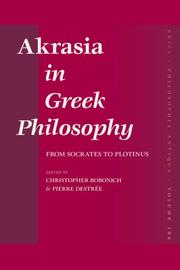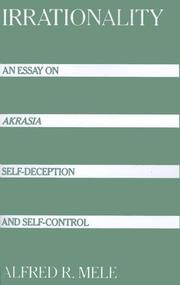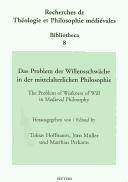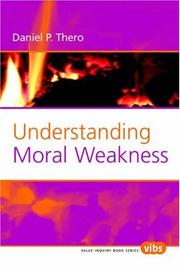| Listing 1 - 9 of 9 |
Sort by
|
Book
ISBN: 9780199896134 Year: 2012 Publisher: Oxford Oxford University Press
Abstract | Keywords | Export | Availability | Bookmark
 Loading...
Loading...Choose an application
- Reference Manager
- EndNote
- RefWorks (Direct export to RefWorks)
Akrasia --- Acrasia (Ethics) --- Incontinence (Ethics) --- Ethics --- Political philosophy. Social philosophy --- Philosophical anthropology

ISBN: 8878390771 9788878390775 Year: 2006 Volume: 300 21 Publisher: Roma Pontificia Università Gregoriana
Abstract | Keywords | Export | Availability | Bookmark
 Loading...
Loading...Choose an application
- Reference Manager
- EndNote
- RefWorks (Direct export to RefWorks)
Self-deception. --- Akrasia. --- Akrasia --- Self-deception --- Acrasia (Ethics) --- Incontinence (Ethics) --- Deception --- Defense mechanisms (Psychology) --- Self-perception --- Ethics
Book
ISBN: 0199866899 1283115980 9786613115980 0199712328 9780199866892 Year: 2009 Publisher: Oxford ; New York : Oxford University Press,
Abstract | Keywords | Export | Availability | Bookmark
 Loading...
Loading...Choose an application
- Reference Manager
- EndNote
- RefWorks (Direct export to RefWorks)
This is a study of legal interference with individual preferences and will canvass the interdisciplinary literature in economics, psychology, philosophy, and law. It discusses the particular conditions necessary for the state to legally interfere with our freedom of choice.
Paternalism. --- Akrasia. --- Perfectionism (Personality trait) --- Personality --- Acrasia (Ethics) --- Incontinence (Ethics) --- Ethics --- Parentalism --- Social classes --- Social control --- Social systems

ISSN: 00791687 ISBN: 9004156704 9789004156708 9786612396960 128239696X 9047420128 9789047420125 Year: 2007 Volume: 106 Publisher: Leiden Brill
Abstract | Keywords | Export | Availability | Bookmark
 Loading...
Loading...Choose an application
- Reference Manager
- EndNote
- RefWorks (Direct export to RefWorks)
Discussions on akrasia (lack of control, or weakness of will) in Greek philosophy have been particularily vivid and intense for the past two decades. Standard stories that presented Socrates as the philosopher who simply denied the phenomenon, and Plato and Aristotle as rehabilitating it straightforwardly against Socrates, have been challenged in many different ways. Building on those challenges, this collective provides new, and in some cases opposed ways of reading well-known as well as more neglected texts. Its 13 contributions, written by experts in the field, cover the whole history of Greek ethics, from Socrates to Plotinus, through Plato, Aristotle, and the Stoics (Cleanthes, Chrysippus, Epictetus).
Akrasia --- Philosophy, Ancient. --- History. --- Akrasia. --- Ethics --- Wilszwakte. --- History --- Ethics, Ancient. --- Morale ancienne --- Histoire --- Philosophy, Ancient --- Ancient philosophy --- Greek philosophy --- Philosophy, Greek --- Philosophy, Roman --- Roman philosophy --- Ethics, Greek --- Acrasia (Ethics) --- Incontinence (Ethics) --- Akrasia - Greece - History.

ISBN: 0195359879 1423735609 9781423735601 1280526602 9781280526602 9780195080018 0195080017 0197730647 Year: 1992 Publisher: New York Oxford University Press
Abstract | Keywords | Export | Availability | Bookmark
 Loading...
Loading...Choose an application
- Reference Manager
- EndNote
- RefWorks (Direct export to RefWorks)
The author demonstrates that certain forms of irrationality - incontinent action and self-deception - which many philosophers have rejected as being logically or psychologically impossible, are indeed possible.
Irrationalism (Philosophy) --- Act (Philosophy) --- Akrasia. --- Self-deception. --- Deception --- Defense mechanisms (Psychology) --- Self-perception --- Acrasia (Ethics) --- Incontinence (Ethics) --- Ethics --- Action (Philosophy) --- Agent (Philosophy) --- Philosophy --- Absurd (Philosophy) --- Belief and doubt --- Rationalism

ISBN: 9042917792 9789042917798 Year: 2006 Volume: 8 Publisher: Leuven Paris Dudley Peeters
Abstract | Keywords | Export | Availability | Bookmark
 Loading...
Loading...Choose an application
- Reference Manager
- EndNote
- RefWorks (Direct export to RefWorks)
German, English, and French.
Filosofie van de Middeleeuwen --- Philosophie du Moyen Age --- Theologie --- Théologie --- Akrasia --- Ethics, Medieval --- Acrasie --- Morale médiévale --- History --- Congresses. --- Histoire --- Congrès --- Morale médiévale --- Congrès --- Medieval ethics --- Acrasia (Ethics) --- Incontinence (Ethics) --- Ethics --- Akrasia - History - To 1500 - Congresses. --- Ethics, Medieval - Congresses.

ISBN: 9401203423 1429456515 9781429456517 9042020784 9789042020788 9789401203425 9042020784 9789042020788 Year: 2006 Publisher: Amsterdam Rodopi
Abstract | Keywords | Export | Availability | Bookmark
 Loading...
Loading...Choose an application
- Reference Manager
- EndNote
- RefWorks (Direct export to RefWorks)
This book considers the common human predicament that we often choose an action other than the one we perceive to be best. Philosophers know this problem as akrasia. The author develops a nuanced understanding of the nature and causes of akrasia by integrating the best insights of Socrates, Aristotle, Augustine, and Aquinas, and several contemporary philosophers.
Akrasia. --- Self-control. --- Will. --- Cetanā --- Conation --- Volition --- Ethics --- Philosophy --- Psychology --- Self --- Self-discipline --- Self-mastery --- Control (Psychology) --- Discipline --- Acrasia (Ethics) --- Incontinence (Ethics) --- Will --- Self-control --- Akrasia --- Volonté --- Maîtrise de soi --- Acrasie --- Deontology --- Ethics, Primitive --- Ethology --- Moral philosophy --- Morality --- Morals --- Philosophy, Moral --- Science, Moral --- Values --- Ethics.

ISBN: 9004099948 9004451072 9789004099944 9789004451070 Year: 1994 Volume: 44 Publisher: Leiden Brill
Abstract | Keywords | Export | Availability | Bookmark
 Loading...
Loading...Choose an application
- Reference Manager
- EndNote
- RefWorks (Direct export to RefWorks)
This book sets out to examine the medieval understanding of Aristotle's famous discussion of "weakness of the will" ( akrasia, incontinentia ) in the seventh book of his Nicomachean Ethics . The medieval views are outlined primarily on the basis of the commentaries on Aristotle's Ethics by Albert the Great, Thomas Aquinas, Walter Burley, Gerald Odonis and John Buridan. An investigation of the earlier Augustinian discussion concerning reluctant actions ( invitus facere ) rounds out the study. The recent studies of weakness of the will have neglected the medieval philosophers. The present volume fills this gap in historical research and shows that especially the conceptual refinement of the fourteenth-century discussion makes contributions that are comparable to those of twentieth-century philosophers.
Ethics [Medieval ] --- Ethiek [Middeleeuwse ] --- Ethique médiévale --- Medieval ethics --- Middeleeuwse ethiek --- Ethics, Medieval --- Will --- Morale médiévale --- Volonté --- History --- Histoire --- Akrasia. --- Ethics, Medieval. --- #GOSA:II.P.AU.3 --- #GOSA:II.P.AU.4 --- #GOSA:II.ME.ANSE.M --- #GOSA:II.ME.THOM.M --- #GROL:SEMI-241<09> --- 17.021.251 --- Cetanā --- Conation --- Volition --- Ethics --- Philosophy --- Psychology --- Self --- History. --- Vrije wil. Wilsvrijheid. --- 17.021.251 Vrije wil. Wilsvrijheid. --- Morale médiévale --- Volonté --- Akrasia --- Acrasia (Ethics) --- Incontinence (Ethics) --- Vrije wil. Wilsvrijheid --- Will - History - To 1500.
Book
ISBN: 0312124678 Year: 1995 Publisher: New York (N.Y.): St. Martin's
Abstract | Keywords | Export | Availability | Bookmark
 Loading...
Loading...Choose an application
- Reference Manager
- EndNote
- RefWorks (Direct export to RefWorks)
Compatibilism --- Determinism and free will --- Determinism and indeterminism --- Determinisme en indeterminisme --- Déterminisme et indéterminisme --- Free agency --- Free will and determinism --- Freedom and determinism --- Freedom of the will --- Indeterminism --- Indeterminisme --- Liberty of the will --- Libre arbitre et déterminisme --- Vrije wil --- Vrije wil en determinisme --- Vrijheid van de wil --- Wilsvrijheid --- #GOSA:II.P.AU.3 --- #GOSA:V.Oud.Ari.M --- Determinism (Philosophy) --- Aristoteles --- Augustine Saint, Bishop of Hippo --- -Views on free will. --- Views on free will --- -Aristoteles --- Aristote --- Aristotle --- Aristotile --- Views on free will. --- Akrasia --- Acrasia (Ethics) --- Incontinence (Ethics) --- Ethics --- Aristotle. --- Augustine, --- Avgustin, Blazhennyĭ, --- Augustinus, Aurelius, --- Augustyn, --- Augustin, --- Ughasṭīnūs, --- Agostino, --- Agustí, --- Augoustinos, --- Aurelius Augustinus, --- Augustinus, --- Agustín, --- Aurelio Agostino, --- Episkopos Ippōnos Augoustinos, --- Augoustinos Ipponos, --- Agostinho, --- Aurelli Augustini, --- Augustini, Aurelli, --- Aurelii Augustini, --- Augustini, Aurelii, --- Ōgostinos, --- Agostino, Aurelio, --- אוגוסטינוס הקדוש --- أغسطينوس، --- 奥古斯丁 --- Aristoteles. --- Augustine --- Avgustin, --- Arisṭāṭṭil --- Aristo, --- Aristotel --- Aristotele --- Aristóteles, --- Aristòtil --- Arisṭū --- Arisṭūṭālīs --- Arisutoteresu --- Arystoteles --- Ya-li-shih-to-te --- Ya-li-ssu-to-te --- Yalishiduode --- Yalisiduode --- Ἀριστοτέλης --- Αριστοτέλης --- Аристотел --- ארסטו --- אריםטו --- אריסטו --- אריסטוטלס --- אריסטוטלוס --- אריסטוטליס --- أرسطاطاليس --- أرسططاليس --- أرسطو --- أرسطوطالس --- أرسطوطاليس --- ابن رشد --- اريسطو --- Pseudo Aristotele --- Pseudo-Aristotle --- アリストテレス --- Augustinus, Aurelius --- Agostinho --- Augustine of Hippo --- Augustine d'Hippone --- Agostino d'Ippona --- Augustin d'Hippone --- Augustinus Hipponensis, sanctus --- Sant'Agostino --- Augustinus van Hippo --- Aurelius Augustinus --- Aurelio Agostino --- 聖アウグスティヌス --- アウグスティヌス
| Listing 1 - 9 of 9 |
Sort by
|

 Search
Search Feedback
Feedback About UniCat
About UniCat  Help
Help News
News